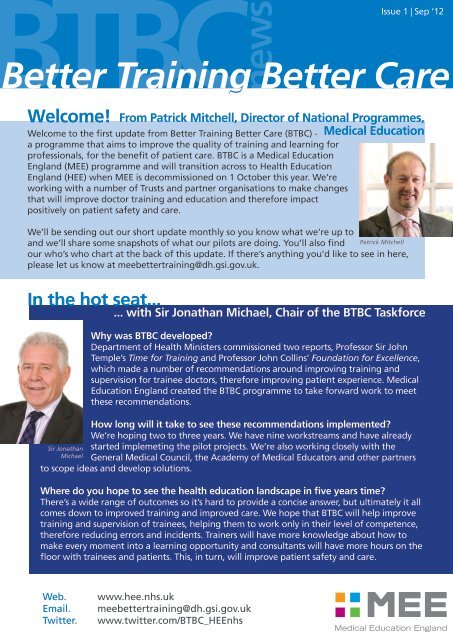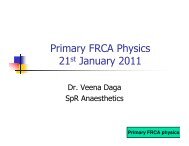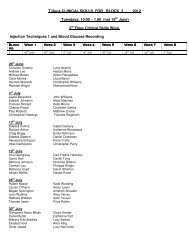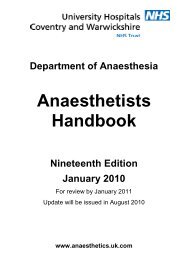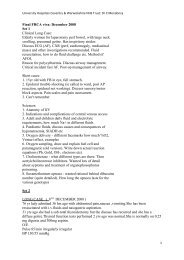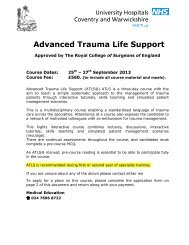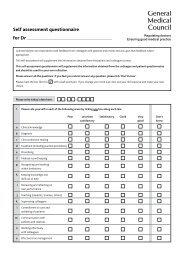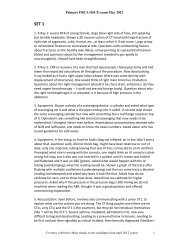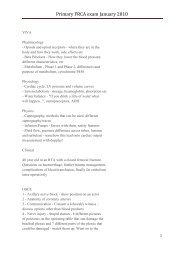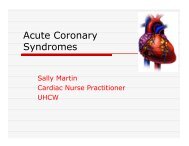Better Training Better Care Better Training Better Care - MEDICAL ...
Better Training Better Care Better Training Better Care - MEDICAL ...
Better Training Better Care Better Training Better Care - MEDICAL ...
- No tags were found...
Create successful ePaper yourself
Turn your PDF publications into a flip-book with our unique Google optimized e-Paper software.
TBCWelcome!newsIssue 1 | Sep ‘12<strong>Better</strong> <strong>Training</strong> <strong>Better</strong> <strong>Care</strong>Welcome to the first update from <strong>Better</strong> <strong>Training</strong> <strong>Better</strong> <strong>Care</strong> (BTBC) -a programme that aims to improve the quality of training and learning forprofessionals, for the benefit of patient care. BTBC is a Medical EducationEngland (MEE) programme and will transition across to Health EducationEngland (HEE) when MEE is decommissioned on 1 October this year. We’reworking with a number of Trusts and partner organisations to make changesthat will improve doctor training and education and therefore impactpositively on patient safety and care.We’ll be sending out our short update monthly so you know what we’re up toand we’ll share some snapshots of what our pilots are doing. You’ll also find Patrick Mitchellour who’s who chart at the back of this update. If there’s anything you’d like to see in here,please let us know at meebettertraining@dh.gsi.gov.uk.In the hot seat...Sir JonathanMichael... with Sir Jonathan Michael, Chair of the BTBC TaskforceWhy was BTBC developed?Department of Health Ministers commissioned two reports, Professor Sir JohnTemple’s Time for <strong>Training</strong> and Professor John Collins’ Foundation for Excellence,which made a number of recommendations around improving training andsupervision for trainee doctors, therefore improving patient experience. MedicalEducation England created the BTBC programme to take forward work to meetthese recommendations.How long will it take to see these recommendations implemented?We’re hoping two to three years. We have nine workstreams and have alreadystarted implemeting the pilot projects. We’re also working closely with theGeneral Medical Council, the Academy of Medical Educators and other partnersto scope ideas and develop solutions.From Patrick Mitchell, Director of National Programmes,Medical EducationWhere do you hope to see the health education landscape in five years time?There’s a wide range of outcomes so it’s hard to provide a concise answer, but ultimately it allcomes down to improved training and improved care. We hope that BTBC will help improvetraining and supervision of trainees, helping them to work only in their level of competence,therefore reducing errors and incidents. Trainers will have more knowledge about how tomake every moment into a learning opportunity and consultants will have more hours on thefloor with trainees and patients. This, in turn, will improve patient safety and care.Web.Email.Twitter.www.hee.nhs.ukmeebettertraining@dh.gsi.gov.ukwww.twitter.com/BTBC_HEEnhs
Our workstreams...The BTBC programme consists of nine workstreams that have been developed with anemphasis on the need for both local and national activity. They are:1. Local implementation and pilots: The BTBC team has awarded funding to 16 NHS Truststo pilot projects that will improve education and training and therefore patient safety.These pilots will meet key recommendations from Time for <strong>Training</strong> and/or Foundation forExcellence.2. Role of the trainee: This project looks at the role of the trainee in terms of traineesupervision and the principles required to ensure appropriate trainee supervision. The BTBCteam is working with the General Medical Council (GMC), the Academy of Royal Colleges,trainee groups and educational bodies to further define and scope out this project.3. Role of trainers: Working with the GMC and Academy of Medical Educators (AoME),BTBC aims to support the development of an implementation guide for the recognition andapproval of medical trainers.4. Workforce planning: Currently in early development, this project aims to support effectiveworkforce planning to enable a consultant present model of service delivery for the future.5. Improving careers guidance and availability: The BTBC team is working on developinga careers guidance portal to support trainees with their career choices. This project willalso seek to address trainee perceptions of particular careers, encouraging a more evendistribution of trainee placements across disciplines.6. Integrated technology enhanced learning: Following the publication of the Framework forTechnology Enhanced Learning, the BTBC team are seeking to develop simulation standardsfor simulation providers and will be holding a showcase event in late 2012.7. Harmonising and improving training: This project consists of a number of components - thefirst of which was to review the Foundation Programme Curriculum, which has taken place.The remainder of the project addresses specific Collins recommendations for more traineesto undertake community-facing placements and support a more even distribution oftrainee placements across specialities with particular emphasis on GP, psychiatry and othercommunity placements. Working across the health education and provider landscape, wehave established three groups that will explore these aims and develop the deliverables.8. Regulatory approach to supporting <strong>Better</strong> <strong>Training</strong> <strong>Better</strong> <strong>Care</strong>: The GMC was tasked withmeeting specific Collins recommendations. Some of the work underway includes a definitionof the outcomes required to complete Foundation Year Two (F2), a review of the 2011-13GMC Education Strategy, an updated GMC Good Medical Practice Guide and exploration ofopportunities to share data among partner organisations.9. Funding and education quality metrics: The BTBC team will explore opportunities withpartner organisations to support effective commissioning and delivery of quality training.This will be facilitated by the introduction of the Education Outcomes Framework, whichwill define and initiate new educational outcome measures. Further work includes thedevelopment of a clinical supervisor framework, which will be done in conjunction with theUK Foundation Programme Office.
Green light for mental health traineesWork is underway at Tees, Esk and Wear Valleys NHS Foundation Trust torevolutionise early supervision and support arrangements for junior doctorsnew to adult and old age psychiatry services.Dr Lenny Cornwall, Consultant Psychiatrist and Deputy Medical Director, said:“The project aims to ensure that trainees new to psychiatry benefit frombetter supervision and support in the early stages of their training so thatthey can perform core tasks more quickly and earlier into post.”Currently, pilot trainees spend their first few days in a ‘red phase’, observingpractice and familiarising themselves with their new working environment,followed by a ‘yellow phase’ where they carry out core tasks with supervisionand support where needed and later with an on-call supervisor. By weekfive, they enter the ‘green phase’ and work independently.A trainee, in the yellowphase, and trainerworking on the pilotprojectDr Cornwall said: “The trainees wear coloured lanyards to help othermembersof the team quickly identify what grade they are, to manage expectations and ensure theycarry out the right kind of work and learning opportunities are maximised.”The Trust’s Medical Education team has also carried out additional training for clinicalsupervisors, who are carrying out workplace-based assessments for every patient encounter.Now that the first cohort of trainees are six weeks into the pilot, the project team plan totake their feedback on board to look at what improvements and changes can be made tothe pilot for the next rotation.East Kent get hot (and cold!)Some of the East Kent teamdiscussing feedback from the pilotEast Kent Hospitals University Foundation Trust’s pilot aims to revisetheir working model to enhance trainee support and improvepatient care. The team has created hot ‘emergency’ and cold ‘wardbased’teams and a multi-professional cold team at weekends.So far they’ve implemented their teams, having recruited anadditional registrar and senior nurse to support foundation doctors.They’ve also put a new customised electronic rostering system inplace, which provides all trainees with both hot and cold experiences.All professionals are supporting the project, and the cold weekend team have found thatafter promptly reviewing their ill patients, they actually have more time for learning andassessment during their shift.Dr Anupkumar Patel, Higher Surgical Trainer, cold team, said: “Our first weekend working asa cold team worked really well. I was able to do some supervised learning events with the F1doctors and because we went around the wards with the senior nurse as a team, we reallydid get through the work.”Moving forward, the Trust will be introducing this model to their new registrars in October,and they’ll be analysing and reviewing patient care and qualitative data to examine if there’sa change with trainees identifying and exploiting learning opportunities at weekends.
Our pilots...Workstream one has 16 pilot sites, each delivering their own projects. They are:• Airedale NHS FT and Western Sussex Hospitals NHS Trust: Using telemedicine forbetter supervision and training.• East Kent Hospitals University NHS FT: <strong>Better</strong> training and supervision out ofhours and on weekends.• East London NHS FT: Reducing the severity, frequency and impact of serious incidents.• Guys’ and St Thomas’ NHS FT: Introduction of a new SMART rota, maximisingtraining with smarter rota design.• Heart of England NHS FT: Enhancing the transition from student to doctorthrough e-learning, mentoring and support.• King’s College Hospital NHS FT: Placing senior clinical decision makers each side ofthe patient journey in the emergency department.• Leeds and York Partnership NHS FT: Maximising training opportunities byincreasing daytime working for trainees.• Leeds Teaching Hospitals NHS Trust: Improving acute surgical training to createbetter equipped trainee surgeons.• Mid Cheshire Hospitals NHS FT: New technology and better training in handoverto improve acute care.• North Bristol NHS Trust: Video-recording of trainee consultations as a training toolin the outpatient department.• Pennine Acute Hospitals NHS Trust: Handheld devices used for better handover.• Pennine Acute Hospitals NHS Trust: Improvements to emergency care with theirin-house trainee challenge.• Royal Berkshire NHS FT: Making every moment count by translating learningopportunities from issues into action.• Tees, Esk and Wear Valleys NHS FT: A new model of clinical supervision for newdoctors in training.• South Manchester NHS FT: Addressing the quality of surgical training of specialtytrainees.• The Dudley Group NHS FT: Bringing together pharmacists and trainees forimproved training and education in prescribing.For more information of each of the pilot projects, visit www.hee.nhs.uk.
BTBCwho’s who?Patrick MitchellDirector of NationalProgrammes – MedicalEducationHead of the BTBCprogrammeMelanie AshdownProgrammeManagement OfficeManagerHeather PennySenior Trust LiaisonManagerJonathan HowesSpecialty <strong>Training</strong>ManagerRelationship ManagerJoanne MarvellSpecialty <strong>Training</strong>ManagerRelationship ManagerMegan StoreyCommunicationsManagerIndia PeachProject Support OfficerEmma ScalesNorthern RelationshipManagerPatrick Mitchell is responsible for leading the whole BTBC programme.Patrick reports to the BTBC Taskforce – a board of independentprofessionals who has responsibility for oversight, governance andoutcomes of the BTBC work.Heather Penny is involved in the planning and delivery of the BTBCprogramme and is responsible for the delivery of workstream one, thepilot phase and workstream three, the role of trainers.Melanie Ashdown leads the BTBC programme management office,ensuring the delivery of all nine workstreams and is leading onworkstream seven.Megan Storey is the lead for all communication activities for the BTBCprogramme, and is leading on workstream two, role of the trainee.Emma Scales is the relationship manager for the northern pilot sites andis leading on workstream six, integrated technology enhanced learning.Jo Marvell will be supporting two pilot sites and will be leading on workstream five, careers guidance.Jonathan Howes will be supporting two pilot sites and will be leading on workstream four, workforce planning.India Peach supports the programme management office in the administration and project management of the BTBC programme.www.hee.nhs.uk | meebettertraining@dh.gsi.gov.uk | www.twitter.com/BTBC_HEEnhs


